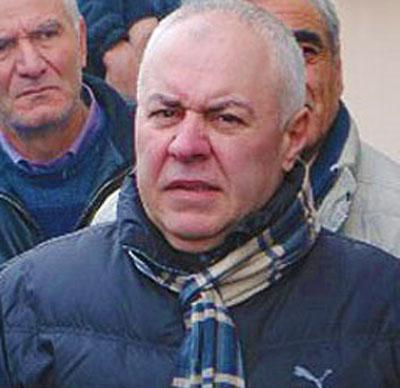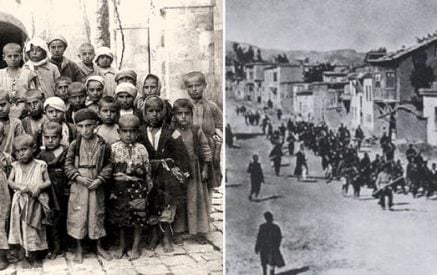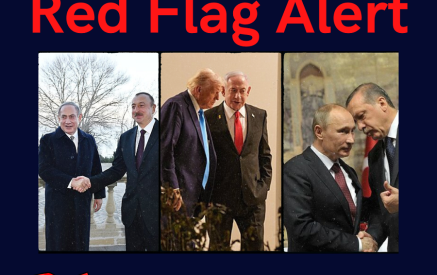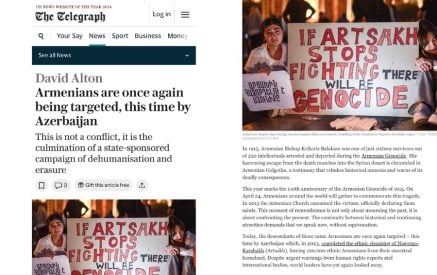Why is Georgia attending the 100th anniversary of the Genocide at the level of the Vice Speaker of the National Assembly, or is the blood of Georgia-residing Azerbaijanis redder?
The delegation headed by the Vice Speaker of the National Assembly of Georgia, Manana Kobakhidze, will attend the centennial events of the Armenian Genocide. Kobakhidze is from the “Georgian Dream” coalition, who is the head of a parliamentary group of friendship with Armenia. The delegation will also include the Armenian members of the group. Two days ago, the Georgian President’s spokesperson explained that they are expecting the visit of the President of Belarus Alexander Lukashenko to Georgia on April 23-24, therefore his country president cannot attend the centennial events held in Yerevan. On this day, a delegation from Georgia will also leave for the events planned in Turkey. The delegation is composed of Georgian Defense Minister Mindia Janelidze and Chairman of Parliament’s Committee on Defense and Security Affairs Irakly Sesiashvili. Former member of the Parliament of Georgia and Javakheti-resident Melik Rayisyan is not surprised at such a low-level representation of the neighboring Georgia in Armenia. He comments Lukashenko’s planned visit to Tbilisi on April 23-24 with ironical smile, ridiculing that if Armenia expected that the President of Georgia as a president of the neighboring country was obliged to be present, then Azerbaijan, Turkey and Iran are also neighbors, why their presence is not expected. “Unfortunately, Georgia has handed over all its statehood levers to Turkey and Azerbaijan,” said our interlocutor, detailing that official Tbilisi is unable to make decisions on its own and implement them, they are necessarily and directly agreed with Turkey and Azerbaijan.
Our interlocutor is surprised at something else. The President of Georgia and the Prime Minister, whose controversies are known to everyone, and they are to the extent that they both have almost no rims of contact, a month ago, at the beginning of Ramadan, twice made an official visit to the Azerbaijani-residence region of Marneuli, publicly demonstrating that the Georgian State – the President and the prime minister, are interested and concerned about their fellow citizens, the problems thereof and share their celebrations. Ramadan was followed by the Holy Easter, which is also the holiday of the Armenians living in Javakheti. The reaction of the official Tbilisi was as follows: Georgia’s State Minister Paata Zakarishvili made a pose on his Facebook page by congratulating the Greek Catholics, Assyrians and Armenians on the occasion of this holiday. Georgian top officials have not only felt the necessity to visit the Armenian-populated Javakheti on the Easter, but they have not even attended any event in any Armenian church in Tbilisi. At the same time, according to our interlocutor, the new requirements of the immigration law stemming from Georgia’s accession to the EU Association Agreement has become a trouble for the Armenians living in Georgia. Though the reinforcement of the law has been repeatedly postponed, this time it was prolonged until June 1, but the Georgian Armenians who are citizens of Russia and Armenia, face various problems at the customs checkpoints. According to official data, 3149 Javakheti Armenian have appeared in the “black list”. Our interlocutor is sure that this number is doubled. They are granted the right to live in Georgia, but it is absurd for these people are citizens of Georgia, are born in this country, grow up, study and serve in the army and ultimately have their own land plots in Georgia, in the event when Georgian law bans foreign nationals to have property and land in their country. And now, if someone dares to cross the border, he will not be allowed back to Georgia to his dwelling because he has violated the law. “You are not evicted from the house, but if you have voluntarily left out, you are not allowed to come back home, they say that you are a citizen of Armenia. The state illegally takes the person’s citizenship,” describes our interlocutor the situation more flexible.
Melik Rayisyan is concerned about two questions. “How do the Georgian border guards know this information that these people are citizens of Armenia? The person leaves Javakheti with a Georgian passport and some time later, returns again with a Georgian passport. Where do they get this information that this person is a citizen of Armenia? And most interestingly, when this law become effective as of September 1 last year, the Ambassador of Azerbaijan to Georgia announced that this law is not applicable to Azerbaijanis living in Georgia. While, two and a half times more Azeris are living in Georgia. It turns out that it is done solely for the Armenians. Kurds and Assyrians also live in Georgia, however, there is neither a Kurdish nor an Assyrian state, so this issue is not applicable to them too.”
Read also
To our question of what the RA Ambassador to Georgia and the Embassy staff are busy with, Melik Rayisyan shook his head multi-meaningfully. “I do not know who and what is busy with, but we are neither Argentine Armenians nor Uruguay, we are Armenians attached to Javakheti. Didn’t people in Armenia know what problems will arise after the application of this law?” To the point, in the interview with the Georgian “Rustavi-2” TV channel, Melik Rayisyan has expressed thanks to the Georgian government that on the threshold of the 100th anniversary of the Genocide they are not forgotten and have organized a new deportation for Armenians. “They, certainly, take my words very badly, but I do not understand that if it is a law and is equal for everybody, let it be effective equally. Why isn’t it applicable to Azerbaijanis, but the Armenians? I have sent an official letter to the Georgian Ministry of Justice with a request to provide data in figures about how many representative of which nationality are deprived of the Georgian citizenship. They failed to provide the data because there is no Azerbaijani in this list. They reasoned that they do not own such information”.
To the observation of whether this is a plan to devastate Javakheti from Armenians, our interlocutor countered that such a program existed long ago, simply the process is getting more organized. The worst part is that the stance of the Republic of Armenia in this entire history is not seen. Several months ago, the delegation from Armenia headed by the Speaker of the National Assembly visited Georgia, they returned and announced that they have also touched upon the problems of Javakheti Armenians and agreements have been reached. “For a discussion, you need to have a posture to be able to consistently move forward. If you do not have a posture, nor a willingness to have it, then what should you discuss?” concluded our interlocutor.
Nelly GRIGORYAN























































